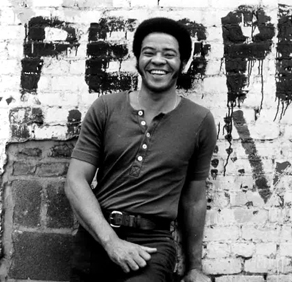A commentary by Jody Rosen in the LA Times recently suggested a change to the National Anthem: A Bill Wither’s Classic, “Lean On Me”
We share this as it’s such a kind thought. Bill would truly be humbled by this.
Read excerpts from the article below:
The Francis Scott Key monument in San Francisco’s Golden Gate Park is one of those old-fashioned pieces of public art that, shall we say, lays it on thick. It is imposing and fussy, a 52-foot-tall chunk of travertine and marble loaded up with classical trimmings. There’s a fluted colonnade, four eagles with majestically fanned-out wings, swags and stars, and, at the very top of the big pile, the figure of Columbia, the traditional female personification of the United States, clutching an American flag.
In the center of the monument is the main attraction, a bronze statue of Key, the Washington, D.C., lawyer who, 206 years ago, wrote the words to “The Star-Spangled Banner” to commemorate the American victory in the Battle of Baltimore, in the War of 1812. Key is captured in a heroic pose: enthroned on a big chair with pen in hand, looking every inch the sort of poetaster who would come up with lines like “O’er the ramparts we watched / Were so gallantly streaming.”
At least this is how the monument used to appear. Today, Francis Scott Key is no longer in Golden Gate Park. On June 20, protesters lassoed the statue with ropes, heaved and hoed, and down came Key, somersaulting off the pediment, head o’er heels. Key was a slave owner, like many of the historical personages whose statues have been defaced and destroyed in the Black Lives Matter uprising that followed the May 25 killing of George Floyd by Minneapolis police. But it was also Key’s role as a songwriter — his famous ode to the land of the free and the home of the brave — that made him a target for protesters.
“The Star-Spangled Banner” had been a fixture of American life for more than a century prior to May 4, 1931, when President Hoover signed a bill establishing the song as the national anthem. The tradition of playing the song prior to sporting events dates to World War II; after the war, NFL commissioner Elmer Layden formalized the practice, declaring “the playing of the national anthem should be as much a part of every game as the kickoff.” This custom has of course become a flash point in the culture wars in recent years, since the 2016 NFL preseason, when San Francisco 49ers quarterback Colin Kaepernick refused to stand for the playing of the song. Kaepernick pointed out that he was making a statement about racial injustice, not protesting the “The Star-Spangled Banner” itself. But now, it seems, the wave of reckoning and revisionism that is sweeping the country may have come for the national anthem.
…At a moment when the United States is in the grip of multiple crises — convulsed by debates over racism and injustice, ravaged by a pandemic, with a crumbling economy and a faltering democracy — the very idea of a national anthem, a hymn to the glory of country, feels like a crude relic, another monument that may warrant tearing down. But if we must have an anthem, it should be far different than the one we’ve got now, positing another kind of patriotism, an alternative idea of America and Americanness. It would also be neat if it was, you know, a decent song, which a citizen could sing without crashing into an o’er or a thee, or being asked to pole vault across octaves.
In fact, there is such a song. The song is “Lean on Me.”
Bill Withers’ 1972 soul ballad may seem like a curious choice. It has none of the qualities we associate with national anthems. It’s a modest song that puts on no airs. It speaks in plain musical language, without a trace of bombast, in a tidy arrangement that unfolds over a few basic chords. It doesn’t march to a martial beat or rise to grand crescendos. The lyrics hold no pastoral images of fruited plains or oceans white with foam, no high-minded invocations of liberty or God. “Lean on Me” is a deeply American song — but it’s not, explicitly at least, a song about America.
Read full article here
Source: https://www.latimes.com/entertainment-arts/music/story/2020-07-14/national-anthem-star-spangled-banner-lean-on-me

